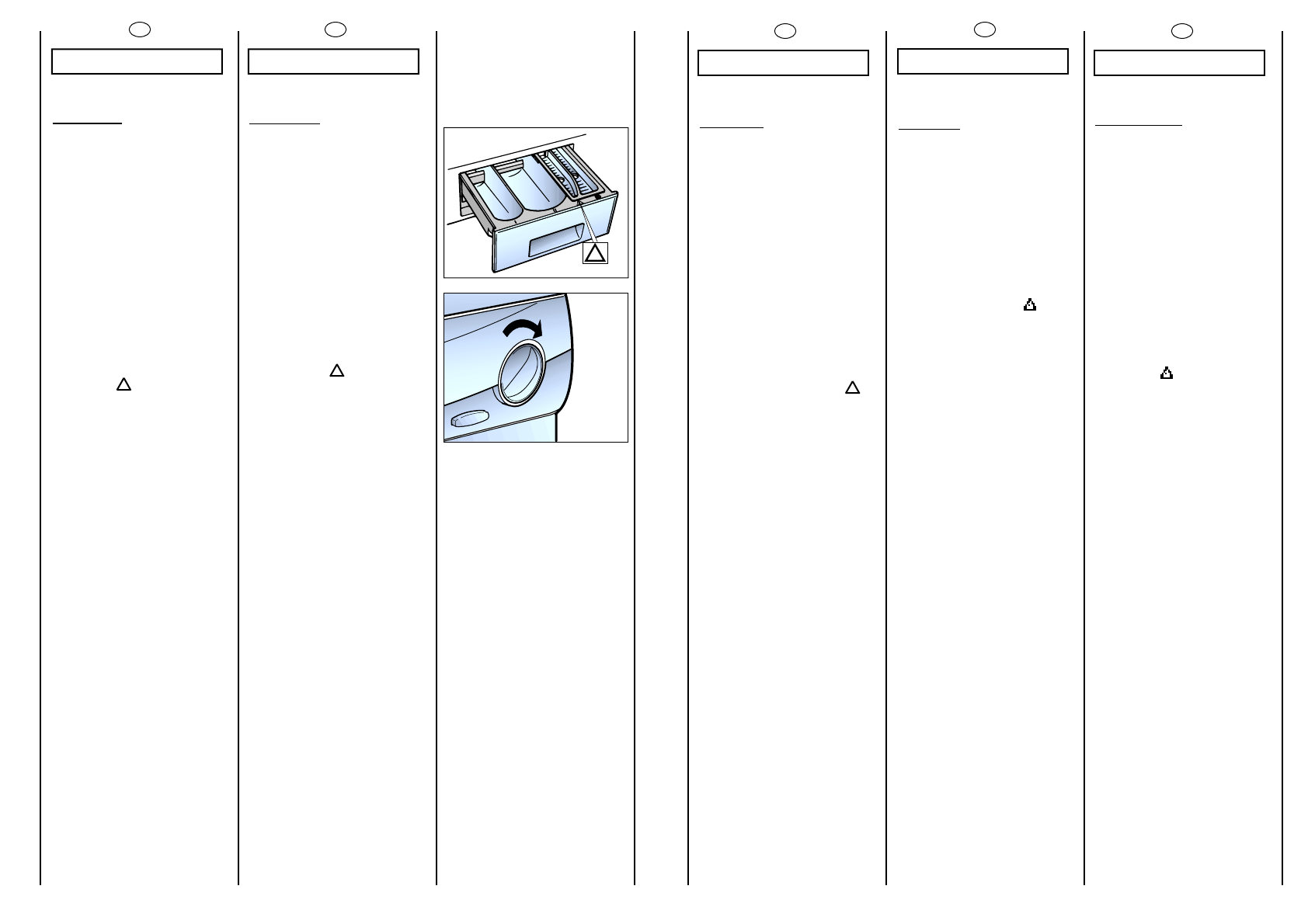Candy CSN 62 T Lavadora – Manual de instrucciones en formato pdf, léalo en línea gratis. Esperamos que le ayude a resolver cualquier duda que pueda tener al utilizar el aparato.
Si aún tiene preguntas, escríbalas debajo del manual de instrucciones.
"Estamos cargando el manual" significa que debe esperar a que se cargue el archivo para poder leerlo en línea. Algunos manuales son muy pesados y el tiempo que tardan en aparecer depende de su velocidad de internet.

cl
EL
K 11
7$!
I '# '$!
'$ '$! $)
( !$
$ '' #(
) ).
8* # '
'$ $
' ! #
$ , '
'$! ' '
) '$!. P$
$ '
'
'' !
# '
( L ) '
7=R7@^& 9YI KIbI=YR
@8K8s]3
Q $/ *
'$!, ( '$'
! '$
') '$!
'$ $$$
'.
$! '$
( '$$ ' ,
'*! '$!
' ! ' $
'$ .
& ' !)
' # * 5
$, / '' )
) # ) !) 2
$ ($
' 1 $ *
'$ '
'# $$) /
'*! ' $
$) ' $!
). Y #
! ' (
.
48
49
cl
EN
CHAPTER 11
WASHING
Let us suppose that the
washing consists of HEAVILY
SOILED COTTON (tough stains
should be removed with the
special cream). When only a
limited number of articles
have stains which require
treatment with liquid
bleaching agents,
preliminary removal of stains
can be carried out in the
washing machine. Pour the
bleach into the special
compartment and set the
knob (L) on the special
programme “PRE-WASH STAIN
REMOVAL”
.
When this phase has
terminated add the rest of
the washing and proceed
with a normal wash on the
most suitable programme.
It is advisable not to wash a
load made up entirely of
articles in towelling fabric
which absorb a lot of water
and become too heavy.
The maximum load for heavy
fabrics is 5 kg, while, in the
case of delicate fabrics, it is
advisable not to exceed 2 kg
(1 kg in the case of machine
washable articles in “Pure
New Wool”) so as to avoid
the formation of creases
which may be difficult to iron.
A net bag should be used for
particularly delicate fabrics.
OK
PL
R
RO
OZZD
DZZIIA
AÄÄ 1111
PRANIE
Zaä
ó
ãmy, ãe pranie skäada
sië z MOCNO ZABRUDZONEJ
BAWEÄNY (trudne do
usuniëcia plamy mogå byç
usuniëte za pomocå
wybielacza). Jeéli tylko
niekt
ó
re rzeczy majå plamy
wymagajåce
potraktowania
wybielaczem, moãliwe jest
wstëpne usuniëcie plam w
pralce. Wlej wybielacz do
specjalnej przegr
ó
dki w
szufladzie na proszek i ustaw
pokrëtäo (L) na specjalnym
programie „WSTËPNE
USUWANIE PLAM” (PRE-
WASH STAIN REMOVAL) .
Po zakoñczeniu tej fazy
dodaj resztë prania i
przyståp do normalnego
prania za pomocå
najbardziej odpowiedniego
programu. Nie zaleca sië
komponowania prania
caäkowicie skäadajåcego sië
z materiaä
ó
w typu
rëcznikowego, kt
ó
re
wchäaniajå duão wody i
stajå sië zbyt ciëãkie.
Maksymalny äadunek dla
materiaä
ó
w wytrzymaäych to
5 kg, zaé w przypadku
materiaä
ó
w delikatnych
zaleca sië nie przekraczanie
2 kg (1 kg w przypadku
rzeczy z weäny nadajåcej sië
do prania mechanicznego),
co pozwoli uniknåç
marszczenia sië materiaä
ó
w i
trudnoéci przy prasowaniu.
W przypadku szczeg
ó
lnie
delikatnych materiaä
ó
w
powinna byç uãywana
specjalna siateczka.
cl
FR
CHAPITRE 11
LAVAGE
Supposons que le linge à
laver soit en COTON
EXTREMEMENT SALE (s’il a des
taches particulièrement
résistantes les enlever avec
un detachant).
Quand certaines pièces ont
des taches qui doivent être
traitées par un produit
blanchissant liquide, vous
pouvez les détacher dans la
machine. Verser le produit
blanchissant liquide dans le
bac et placer la manette (L)
sur le programme spécial:
“DETACHAGE
PRE-LAVAGE”
.
Après ce traitement, ajouter
à ces pièces le reste du linge
et effectuer un lavage
normal selon le programme
choisi.
Nous vous conseillons de ne
pas faire un lavage
exclusivement de serviettes-
éponge qui, absorbant
beaucoup d’eau,
deviennent trop lourdes.
La charge admise pour les
tissus résistants est de 5 kg,
tandis qu’en cas de tissus
délicats nous conseillons de
ne pas dépasser 2 kg (1 kg
en cas de pièces en “pure
laine vierge” lavables dans la
machine à laver), pour éviter
la formation de plis difficiles à
repasser. Pour les tissus
extrêmement délicats nous
conseillons d’utiliser un filet.
cl
RU
èÄêÄÉêÄî 11
CíàêäÄ
è‰ÔÓÎÓÊËÏ, ˜ÚÓ ‰Îfl ÒÚËÍË
‚˚·Ë‡˛Ú ·Âθ ËÁ ıÎÓÔ͇ Ò Ó˜Â̸
ÒËθÌ˚Ï Á‡„flÁÌÂÌËÂÏ (ÔË
̇΢ËË ÔflÚÂÌ Ëı ÒΉÛÂÚ Û·‡Ú¸
ÒÔˆ. Ò‰ÒÚ‚‡ÏË).
ÖÒÎË Ëϲ˘ËÂÒfl ÔflÚ̇ ̇ ËÁ‰ÂÎËË
ÏÓÊÌÓ ÓÚ·ÂÎË‚‡Ú¸, Ç˚ ÏÓÊÂÚÂ
҉·ڸ ˝ÚÓ ÔË ÒÚËÍ ‚ χ¯ËÌÂ.
ç‡ÎÂÈÚ ÓÚ·ÂÎË‚‡ÚÂθ ‚ ·‡˜ÓÍ Ë
ÔÓÒÚ‡‚¸Ú ÛÍÓflÚÍÛ (L) ̇
ÔÓ„‡ÏÏÛ: “Û ‰‡ÎÂÌË ÔflÚÂÌ ‚
Ô‰‚‡ËÚÂθÌÓÈ ÒÚËÍ” .
èÓÒΠӷ‡·ÓÚÍË ‰Ó·‡‚¸ÚÂ
ÓÒڇθÌÓ ·ÂÎ¸Â Ë ÓÒÛ˘ÂÒÚ‚ËÚÂ
ÌÓχθÌÛ˛ ÒÚËÍÛ ÔÓ ‚˚·‡ÌÌÓÈ
ÔÓ„‡ÏÏÂ.
å˚ Ì ÒÓ‚ÂÚÛÂÏ Ç‡Ï ÒÚˇڸ
·Óθ¯Ó ÍÓ΢ÂÒÚ‚Ó ËÁ‰ÂÎËÈ ËÁ
χıÓ‚˚ı Ú͇ÌÂÈ, ÍÓÚÓ˚Â
‚·Ë‡˛Ú ‚ Ò·fl ‚Ó‰Û Ë ÒÚ‡ÌÓ‚flÚÒfl
Ó˜Â̸ ÚflÊÂÎ˚ÏË.
ÑÎfl ÔÓ˜Ì˚ı Ú͇ÌÂÈ Á‡„ÛÁ͇
χ¯ËÌ - 5 Í„, ‚ ÚÓ ‚ÂÏfl Í‡Í ‰Îfl
‰ÂÎË͇ÚÌ˚ı Ú͇ÌÂÈ Ï˚ ÒÓ‚ÂÚÛÂÏ ÌÂ
Ô‚˚¯‡Ú¸ Á‡„ÛÁÍÛ 2 Í„ (1 Í„ ‰Îfl
˜ËÒÚÓ¯ÂÒÚflÌ˚ı ËÁ‰ÂÎËÈ “‰Îfl
χ¯ËÌÌÓÈ ÒÚËÍË”), ˜ÚÓ·˚
ËÁ·Âʇڸ Ó·‡ÁÓ‚‡ÌËfl ÚÛ‰ÌÓ‡Á„
·ÊË‚‡ÂÏ˚ı ÒÍ·‰ÓÍ.
àÁ‰ÂÎËfl ËÁ Ó˜Â̸ ‰ÂÎË͇ÚÌ˚ı
Ú͇ÌÂÈ ÒÓ‚ÂÚÛÂÏ ÒÚˇڸ ‚
χÚ˜‡ÚÓÏ Ô‡ÍÂÚÂ.
¿Tiene más preguntas?¿No ha encontrado la solución a su problema en el manual o tiene otros problemas? Haga su pregunta en el siguiente formulario con una descripción detallada de su situación para que otras personas y expertos puedan responderla. Si sabe cómo resolver el problema de otra persona, ayúdele :)






























